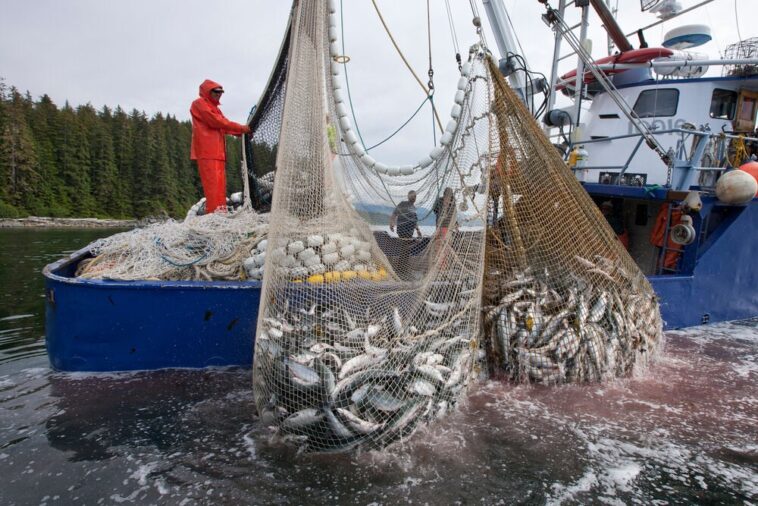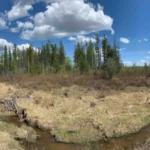The Tŝilhqot’in National Government (TNG) is calling on the Pacific Salmon Commission to halt the Alaskan District 104 Fishery, citing concerns that Alaskan interception of vulnerable salmon stocks is accelerating the decline of key populations vital to Indigenous and local fisheries.
The call to action came as Tŝilhqot’in leaders attended the commission’s 40th annual meeting in Portland, Oregon, where discussions on the Pacific Salmon Treaty and cross-border fisheries management took place.
Declining Salmon Stocks and Scientific Assessments
Salmon populations in BC’s interior have experienced significant declines in recent years. A 2023 report by Raincoast Conservation Foundation notes that more than half of the Fraser River salmon populations are now threatened or endangered
In 2019, sockeye salmon returns were so low that fisheries in both Canada and the United States were forced to close in an effort to protect struggling populations.
“The Tŝilhqot’in Nation made the difficult decision to close its own traditional, community-based fishery at a tremendous sacrifice to the community’s cultural practices and food security,” wrote the nation in its press release.
Despite these closures, the Alaskan District 104 Fishery remained operational and harvested approximately 45,000 Chilko River sockeye, a salmon population that the Tŝilhqot’in Nation considers central to its traditional fishery. Additionally, the Alaskan fishery caught 78,000 Fraser River sockeye at a time when no First Nations along the Fraser River were permitted to fish due to conservation concerns.
“Our people depend on the salmon run every year to ensure that our families do not go hungry.”
Nits’ilʔin (Chief) Joe Alphonse
According to the Tŝilhqot’in National Government (TNG), the continued interception of these salmon in Alaskan waters is exacerbating food insecurity for Indigenous communities and violating their Indigenous rights. The nation emphasizes that salmon are not only a crucial food source but also play an integral role in cultural and ceremonial practices along the Chilko and Fraser Rivers.
Economic Impact on Local Fisheries
The decline of Chilko and Fraser River salmon has had significant economic consequences for Indigenous and community fisheries. Local fishers who once relied on abundant salmon runs have seen their catches dwindle, threatening food security and livelihoods.
“Our people depend on the salmon run every year to ensure that our families do not go hungry,” Nits’ilʔin (Chief) Joe Alphonse said in a February 11 press release issued by the Tŝilhqot’in National Government (TNG).
Local fishery organizations have raised concerns that without immediate intervention, ongoing interceptions will lead to long-term financial strain, job losses, and even the collapse of certain fishing sectors.
A Long-Standing Issue with No Resolution
Concerns over Alaskan interception of BC-bound salmon are not new. Fisheries researchers and Indigenous leaders have raised alarms for over two decades about the impact of the District 104 Fishery. However, enforcement and oversight have been limited.
“Year after year we are faced with record low Chilko sockeye returns while the Alaskan 104 Fishery catches these salmon without limit.”
Nits’ilʔin (Chief) Joe Alphonse
Alaskan interception fisheries have significantly impacted BC salmon populations. In 2023, Southeast Alaskan fisheries harvested over 3 million BC-bound salmon and steelhead, including sockeye, chum, pink, coho, Chinook, and steelhead.
In 2021, these fisheries caught nearly 800,000 sockeye salmon, with the majority originating from Canadian streams.
“Year after year, we are faced with record low Chilko sockeye returns while the Alaskan 104 Fishery catches these salmon without limit,” said Alphonse.
Additionally, over 1.2 million chum salmon were harvested, some of which were from populations of concern in BC. The same year, approximately 51,000 Chinook salmon were taken in Southeast Alaskan troll fisheries, predominantly destined for rivers in BC and Washington.
Call for Change
The Pacific Salmon Treaty, which governs salmon-sharing agreements between Canada and the US, has been criticized for failing to prevent overharvesting of at-risk stocks.
“We call on the Pacific Salmon Commission to stop the Alaskan 104 Fishery until the Chilko sockeye run rebounds and to create a meaningful seat at the decision-making table for the Tŝilhqot’in Nation to manage our own stocks.”
Nits’ilʔin (Chief) Joe Alphonse
While BC fishers have faced restrictions and closures, Alaskan fleets continue to operate under less stringent regulations. The lack of a cap on interceptions in Alaskan waters has been a major point of contention, with critics arguing that conservation efforts in BC are rendered ineffective when Canadian-bound salmon are harvested before reaching spawning grounds.
With salmon populations at risk, the Tŝilhqot’in Nation is urging the Pacific Salmon Commission to take immediate action.
“We call on the Pacific Salmon Commission to stop the Alaskan 104 Fishery until the Chilko sockeye run rebounds and to create a meaningful seat at the decision-making table for the Tŝilhqot’in Nation to manage our own stocks,” said Alphonse.




